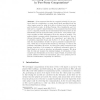Free Online Productivity Tools
i2Speak
i2Symbol
i2OCR
iTex2Img
iWeb2Print
iWeb2Shot
i2Type
iPdf2Split
iPdf2Merge
i2Bopomofo
i2Arabic
i2Style
i2Image
i2PDF
iLatex2Rtf
Sci2ools
138
click to vote
ASIACRYPT
2005
Springer
2005
Springer
Revealing Additional Information in Two-Party Computations
Abstract. A two-argument function is computed privately by two parties if after the computation, no party should know anything about the other inputs except for what he is able to deduce from his own input and the function value. In [1] Bar-Yehuda, Chor, Kushilevitz, and Orlitsky give a complete characterisation of two-argument functions which can be computed privately (in the information-theoretical sense) in the Honest-But-Curious model and study protocols for “non-private” functions revealing as little information about the inputs as possible. The authors define a measure which determines for any function f the additional information E(f) required for computing f and claim that f is privately-computable if and only if E(f) = 0. In our paper we show that the characterisation is false: we give a privately-computable function f with E(f) = 0 and another function g with E(g) = 0 that is not privately-computable. Moreover, we show some rather unexpected and strange properties of the...
Related Content
| Added | 26 Jun 2010 |
| Updated | 26 Jun 2010 |
| Type | Conference |
| Year | 2005 |
| Where | ASIACRYPT |
| Authors | Andreas Jakoby, Maciej Liskiewicz |
Comments (0)

